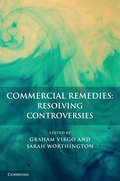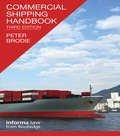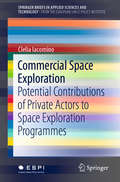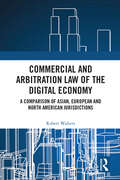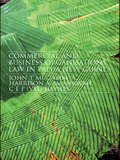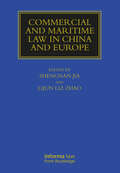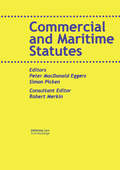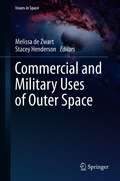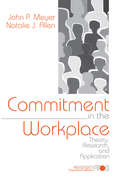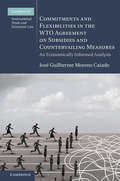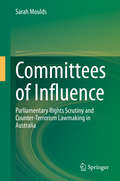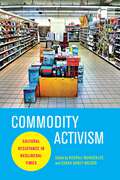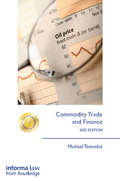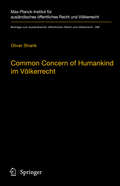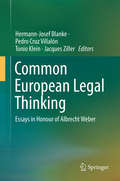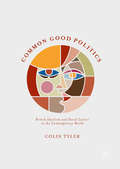- Table View
- List View
Commercial Lawcards 2012-2013 (Lawcards)
by RoutledgeRoutledge Lawcards are your complete, pocket-sized guides to key examinable areas of the undergraduate law curriculum and the CPE/GDL. Their concise text, user-friendly layout and compact format make them an ideal revision aid. Helping you to identify, understand and commit to memory the salient points of each area of the law, shouldn’t you make Routledge Lawcards your essential revision companions? Fully updated and revised with all the most important recent legal developments, Routledge Lawcards are packed with features: Revision checklists help you to consolidate the key issues within each topic Colour coded highlighting really makes cases and legislation stand out Full tables of cases and legislation make for easy reference Boxed case notes pick out the cases that are most likely to come up in exams Diagrams and flowcharts clarify and condense complex and important topics '...an excellent starting point for any enthusiastic reviser. The books are concise and get right down to the nitty-gritty of each topic.' - Lex Magazine Routledge Lawcards are supported by a Companion Website offering: flashcard glossaries allowing you to test your understanding of key terms and definitions Multiple Choice Questions to test and consolidate your revision of each chapter Advice and tips to help you better plan your revision and prepare for your exams Titles in the Series: Commercial Law; Company Law; Constitutional Law; Contract Law; Criminal Law; Employment Law; English Legal System; European Union Law; Evidence; Equity and Trusts; Family Law; Human Rights; Intellectual Property Law; Jurisprudence; Land Law; Tort Law
Commercial Remedies: Resolving Controversies
by Virgo Graham Qc Worthington Sarah Qc Hon FbaThe law of commercial remedies raises a number of important doctrinal, theoretical and practical controversies which deserve sustained and rigorous examination. This volume explores such controversies and suggests solutions, which is essential to ensure that the law is defensible, clear and just. With contributions from twenty-three leading academic and practitioner experts, this book addresses significant issues in the law which, taken together, range across the entire remedial jurisdiction as it applies to commercial disputes. The book primarily focuses on the resolution of controversies in the English law of commercial remedies, but recent developments elsewhere are also considered, especially in other common law jurisdictions. The result provides remarkably comprehensive coverage of the field which will be of relevance to academics, students, judges and practitioners.
Commercial Shipping Handbook (Lloyd's Practical Shipping Guides Ser.)
by Peter BrodieThe Commercial Shipping Handbook is an invaluable reference tool for anyone involved in international trade and a first step towards understanding the framework within which the international movement of goods by sea is conducted. The handbook gives concise explanations of the many activities that comprise shipping, explaining the terms and how they interrelate. Areas covered include: Documents used in international transport by sea e.g. the bill of lading and the charter-party – what they contain, the different types and examples of each Generic types of ships, cargoes, containers and ports Details of all the major maritime associations prominent in contract drafting and policy making, together with a brief explanation of their objectives The many extra costs and surcharges found in shipping, particularly in liner shipping Chartering terms, an explanation of each and their context Clauses appearing in bills of lading, in voyage charters and time charters Technical elements of shipping as they relate to the commercial operation of ships, for example tides and draughts Examples of principal documents Discussing over 1250 commercial shipping terms, this book will be an essential reference for all shipowners, charterers, managers and brokers and will also be of use to legal, insurance and banking professionals.
Commercial Space Exploration: Potential Contributions of Private Actors to Space Exploration Programmes (SpringerBriefs in Applied Sciences and Technology)
by Clelia IacominoThis book offers a comprehensive overview of current space exploration in terms of geopolitical and commercial aspects. Despite multiple attempts to foster commercial activities in the field of space exploration, for decades the domain largely continued to be funded and led by governments in the form of national and international programmes. However, the situation changed with the retirement of the Space Shuttle and the introduction of NASA’s Commercial Orbital Transportation Services (COTS) programme, which employed an innovative procurement scheme based on competitive, performance-based, fixed-price milestones. The success of this programme marked an important milestone in the evolution of the relationship between government and industry. The growing opportunities for private actors to make more prominent contributions to space exploration also lie in the “New Space” ecosystem, a sectoral transformation characterised by a substantial increase in private investment and the emergence of commercial efforts to develop disruptive concepts and address new markets.
Commercial Speech as Free Expression: The Case for First Amendment Protection (Cambridge Studies on Civil Rights and Civil Liberties)
by Martin H. RedishFor many years, commercial speech was summarily excluded from First Amendment protection, without reason or logic. Starting in the mid-1970s, the Supreme Court began to extend protection but it remained strictly limited. In recent years, that protection has expanded, but both Court and scholars have refused to consider treating commercial speech as the First Amendment equivalent of traditionally protected expressive categories such as political speech or literature. Commercial Speech as Free Expression stands as the boldest statement yet for extending full First Amendment protection to commercial speech by proposing a new, four-part synthesis of different perspectives on the manner in which free expression fosters and protects expressive values. This book explains the complexities and subtleties of how the equivalency principle would function in real-life situations. The key is to recognize that as a matter of First Amendment value, commercial speech deserves treatment equivalent to that received by traditionally protected speech.
Commercial and Arbitration Law of the Digital Economy: A Comparison of Asian, European and North American Jurisdictions
by Robert WaltersThis book discusses the importance of the digital economy and its most pressing challenge: the onset of quantum and critical technology. It looks at how its implementation, either on its own or coupled with artificial intelligence, impacts commercial and arbitration law.International trade and investment are increasingly being integrated within national security policy and the law to protect the nation state. A failure to safeguard personal and commercial data will allow other state and non-state actors to set the rules that do not align with the values of the rule of law and transnational rules-based system. This book argues that it is necessary to establish a principles-based approach to governing the development and use of these technologies. Chapters touch on the application of smart contracts, arbitration, as well as mergers and acquisitions and their potential weaponisation in the digital economy due to their ability to transcend national security. Elements of intellectual property, particularly patents and trademarks, and how international legal instruments have directed national law-making are also explored.This is a useful reference for governments, regulators, legal, technologists and policy experts. This is also of interest to scholars looking at personal and commercial data in relation to intellectual property, contracts and international commercial arbitration law.
Commercial and Business Organizations Law in Papua New Guinea
by John Mugambwa Harrison Amankwah C.E.P. (Val) HaynesA timely and apposite treatise on Papua New Guinea’s economic environment, this book explores business organizations law and various aspects of commercial law in Papua New Guinea in a readable and informative style. Business and commerce is the twin engine that propels the economy of a modern nation. They ensure steady economic growth and development. In an age of globalization, they assume even greater importance than at any other time in human history. A nation risks being marginalized or left behind in the race for a share of the world economic market unless it ensures the stability of its business and commercial sector. Trade regulation, good governance and democratic institutions go hand in hand in guaranteeing political and social equilibrium. As such the laws designed to facilitate trade and commerce are a vital component of the political and social equation. This is a valuable book for law students, legal practitioners, accountants and business executives, not only within Papua New Guinea, but also in Australia and throughout the South Pacific.
Commercial and Maritime Law in China and Europe (Maritime and Transport Law Library)
by Shengnan Jia and Lijun Liz ZhaoBoth China and Europe have a long tradition of commercial and maritime law; and this new book examining various topics from their particular perspectives is both timely and important. It links the vital component of maritime law with commercial law, financial law and trade policy. The book has performed a remarkable task in making connections between China and Europe through the lenses of substantive and procedrual laws, covering a wide range of areas, including commercial law, insurance law, salvage, EU maritime law and Brexit, carriage of goods by sea, arbitration, mediation, litigation, the recently formed China International Commercial Court, and different liability regimes, as well as a brief look forward into new initiatives and artificial intelligence in the digital age. In these challenging times, we all have much to learn from each other in seeking to find answers to what are often difficult problems. This book provides a welcome opportunity for anyone interested in commercial and maritime law to engage in that learning exercise and, looking ahead, thereby to help solve such problems as may arise in the future – in a practical and fair manner. It is therefore of great relevance to both the academic field and the legal practice field in China and Europe.
Commercial and Maritime Statutes: Commercial And Maritime Statutes (Maritime and Transport Law Library)
by Peter MacDonald Eggers Simon PickenThis collection of statutes form a reference point for the maritime, commercial and insurance litigator. It covers 35 statutes, some with a commentary and list of key cases to aid with interpretation of the statute.
Commercial and Military Uses of Outer Space (Issues in Space)
by Melissa De Zwart Stacey HendersonThis edited book brings together a diverse range of chapters on space related topics. The authors included in this book are drawn from Australia and overseas, from academia, government, industry, civil society and the military. This book contains chapters that cover topics such as law, science, archaeology, defence, policy, and more, all with a focus on space. This edited collection is a timely international and interdisciplinary book, which addresses some of the contemporary issues facing activities in space and those attempting to understand, use and regulate the space domain. This edited book seeks to normalise the role of women as experts in the space sector, by not calling attention to the fact that all the authors are women – they are all experts in their respective fields who just happen to be women. Bringing together these contributions in this book in turn promotes the inclusion of diversity in the space sector. This edited collection is an opportunity to influence the development of the space industry – in terms of gender diversity, and diversity of disciplines and thinking – while it is in its formative stage, rather than trying to redress imbalances once they are entrenched in the industry.
Commercial law
by Saud AlremeithiRethinking and Reconfiguring the Anthropomorphic Concept of Corporate Personality Some Suggestions for Personality Needs in the Light of Corporate Development in Public Companies with a Particular Focus on the United Arab Emirates.
Commissions of Inquiry and Policy Change
by Gregory J. Inwood Carolyn M. JohnsCommissions of inquiry are a vital and ubiquitous part of the Canadian policy landscape. Established to answer the tough questions, they have been charged with examining almost every aspect of public life.This collection brings together leading Canadian scholars working in political science, public policy, and law to explore fundamental questions about the relationship between commissions of inquiry and public policy for the first time: What role do commissions play in policy change? Would policy change have happened without them? Why do some commissions result in policy changes while others do not?In search of answers, Commissions of Inquiry and Policy Change analyses ten landmark inquiries ranging across a variety of political, economic, social, cultural, environmental, and legal issues. Filling a significant gap in the literature, this volume will be a valuable resource for scholars and students of Canadian political science, public policy, law, and history, as well as a broader audience of readers interested in commissions of inquiry and their role in Canadian policymaking.
Commitment in the Workplace: Theory, Research, and Application (Advanced Topics in Organizational Behavior series)
by John P. Meyer Natalie J. AllenWhat is a committed employee? Are employees who are committed better or worse off than employees who are uncommitted? What are the organizational advantages and disadvantages of having a committed workforce? Commitment in the Workplace provides an overview of academic and popular perspectives on what committed employees look like and how they become committed. The multiple faces of commitment are examined as are the links that have been established between the various forms of commitment and organizational behavior. In addition, questions concerning individual differences, organizational characteristics, and work experiences associated with commitment are explored. The book concludes with a discussion of what organizations can do to manage commitment effectively, including commitment under more difficult circumstances, such as merger/acquisition, downsizing, and relocation. One of the great strengths of the book is that it summarizes the key organizational commitment research in such a way that the research findings can be evaluated for both their scientific merit and their practical value. The primary audience for Commitment in the Workplace includes students in MBA and executive MBA programs, researchers, and students and practitioners in the fields of organizational behavior and industrial psychology.
Commitments and Flexibilities in the WTO Agreement on Subsidies and Countervailing Measures: An Economically Informed Analysis (Cambridge International Trade and Economic Law)
by José Guilherme CaiadoThe ability of countries to promote and protect their domestic industries in the face of stiff global competition is an important consideration in any trading agreement. Member states of the World Trade Organization are expected to adhere to the WTO Agreement on Subsidies and Countervailing Measures, but to what extent do the WTO Members have policy space to subsidize their industries? Using an economically informed framework, Caiado examines the flexibilities countries may find at the WTO to grant subsidies and impose tariffs to protect designated industries. By testing the Treaty system of entitlements and enforcement mechanisms against the theory of incomplete contract, this work offers a comprehensive analysis of the capacity of the SCM Agreement to achieve its goal: the concomitant regulation of opportunistic behavior and assurance of ex post flexibility.
Committed to Rights: UN Human Rights Treaties and Legal Paths for Commitment and Compliance
by Audrey L. ComstockInternational treaties are the primary means for codifying global human rights standards. However, nation-states are able to make their own choices in how to legally commit to human rights treaties. A state commits to a treaty through four commitment acts: signature, ratification, accession, and succession. These acts signify diverging legal paths with distinct contexts and mechanisms for rights change reflecting legalization, negotiation, sovereignty, and domestic constraints. How a state moves through these actions determines how, when, and to what extent it will comply with the human rights treaties it commits to. Using legal, archival, and quantitative analysis this important book shows that disentangling legal paths to commitment reveals distinct and significant compliance outcomes. Legal context matters for human rights and has important implications for the conceptualization of treaty commitment, the consideration of non-binding commitment, and an optimistic outlook for the impact of human rights treaties.
Committed: A Rabble-rouser's Memoir
by Dan MathewsCommitted is a bold, offbeat, globe-trotting memoir that shows how the most ridiculed punching bag in high school became an internationally renowned crusader for the most downtrodden individuals of all -- animals. This irresistibly entertaining book recounts the random incidents and soul-searching that inspired a reluctant party boy to devote his life to a cause, without ever abandoning his sense of mischief and fun. "Everyone has a tense moment in their career that makes them wonder, how the hell did I get into this mess?" writes Mathews. "For me, it was when I was dressed as a carrot to promote vegetarianism outside an elementary school in Des Moines, and a pack of obese pig farmers showed up and peeled off slices of bologna for kids to throw at me." As the irreverent force behind the colorful crusades carried out by People for the Ethical Treatment of Animals (PETA), one of the most effective and enduring pressure groups in the world, Mathews has strutted naked before a fur convention in Tokyo, halted GM's use of animals in crash tests by storming the carmaker's float in the Rose Parade dressed as a rabbit, and crashed a fashion show in Milan dressed as a priest. With self-deprecating wit and candor, Mathews reveals all the edgy details of his unorthodox coming-of-age and equally outrageous career. With backdrops such as the rock scene in Hollywood and London, the inner sanctums of New York high fashion, jails in Hong Kong and Boston, and a psychiatric ward in Paris, Committed spotlights the adventures life can offer when you don't abandon your youthful ideals and imagination.
Committees of Influence: Parliamentary Rights Scrutiny and Counter-Terrorism Lawmaking in Australia
by Sarah MouldsThis book includes original and ground breaking research into parliamentary law making and legislative responses to counter-terrorism in Australia. This book introduces new, holistic and evidenced-based methods of evaluating how parliaments deliberate on complex policy issues, and how they weigh up competing rights and interests. Although this book is focused on the Australian experience, it has relevance across all parliamentary democracies grappling with the challenges posed by ensuring robust rights protection whilst responding to the threat of terrorism. This book will be of relevance and interest to law makers, government administrators and public servants, law enforcement and intelligence agencies, political and legal scholars, law students and members of the legal profession.This book is designed to provide a unique, evidence-based perspective on Australia's parliamentary model of rights protection and on the experience of counter-terrorism law making in Australia since 2011. By focusing on the role and impact of the federal parliamentary committee system, this book offers a fresh perspective on the contemporary legal and political debate on the best legal mechanism for rights protection in Australia. By using counter-terrorism laws as a detailed case study, this book also contributes in a timely, authoritative way to the debate on balancing individual liberties with national security. Using a contemporary case study of Australia's counter-terrorism, this book employs a unique, three tiered methodology to explore the impact of the system of parliamentary committees system on federal laws. The findings in this book give rise to practical recommendations for reform and provide a fresh new perspectives on Australia's parliamentary model of rights protection. This book has broad implications for rights scholars and rights advocates contemplating new models of rights protection in Australia. This book offers important practical insights to other jurisdictions grappling with the challenges posed by ensuring robust rights protection whilst responding to the threat of terrorism.
Commodified Communion: Eucharist, Consumer Culture, and the Practice of Everyday Life
by Antonio Eduardo AlonsoWINNER, 2021 HTI BOOK PRIZEResist! This exhortation animates a remarkable range of theological reflection on consumer culture in the United States. And for many theologians, the source and summit of Christian cultural resistance is the Eucharist. In Commodified Communion, Antonio Eduardo Alonso calls into question this dominant mode of theological reflection on contemporary consumerism. Reducing the work of theology to resistance and centering Christian hope in a Eucharist that might better support it, he argues, undermines our ability to talk about the activity of God within a consumer culture. By reframing the question in terms of God’s activity in and in spite of consumer culture, this book offers a lived theological account of consumer culture that recognizes not only its deceptions but also traces of truth in its broken promises and fallen hopes.
Commodity Activism: Cultural Resistance in Neoliberal Times (Critical Cultural Communication #21)
by Sarah Banet-Weiser Roopali MukherjeeBuying (RED) products—from Gap T-shirts to Apple—to fight AIDS. Drinking a “Caring Cup” of coffee at the Coffee Bean & Tea Leaf to support fair trade. Driving a Toyota Prius to fight global warming. All these commonplace activities point to a central feature of contemporary culture: the most common way we participate in social activism is by buying something. Roopali Mukherjee and Sarah Banet-Weiser have gathered an exemplary group of scholars to explore this new landscape through a series of case studies of “commodity activism.” Drawing from television, film, consumer activist campaigns, and cultures of celebrity and corporate patronage, the essays take up examples such as the Dove “Real Beauty” campaign, sex positive retail activism, ABC’s Extreme Home Makeover, and Angelina Jolie as multinational celebrity missionary.Exploring the complexities embedded in contemporary political activism, Commodity Activism reveals the workings of power and resistance as well as citizenship and subjectivity in the neoliberal era. Refusing to simply position politics in opposition to consumerism, this collection teases out the relationships between material cultures and political subjectivities, arguing that activism may itself be transforming into a branded commodity.
Commodity Trade and Finance (The Grammenos Library)
by Michael TamvakisWhat affects the supply of oil? How important is the weather in determining grain prices? Why has the price of copper skyrocketed? This unique book analyses the economics of key commodity groups, including energy, agriculture and metals. It examines the supply/demand fundamentals of several major and minor commodities, physical characteristics, production and consumption patterns, trade flows and pricing mechanisms. It also explains the main tools used to hedge price risk, such as futures, options and swaps. This second edition has been fully revised and restructured, and contains four new chapters, including oil refining, electricity and price risk management for energy, metals and agricultural commodities This book is an indispensable reference text for students, academics and those working in the commodity business.
Common Commercial Policy after Lisbon: Special Issue (European Yearbook of International Economic Law)
by Christoph Herrmann Marc BungenbergSince the beginning of the process of European integration the EU Common Commercial Policy (CCP) has been one of the most dynamic political fields. The EU has achieved a leading role among the economic superpowers and is regarded as a single economic area in which the EU speaks also on behalf of its Member States for most aspects of external economic politics. This volume analyzes the implications of the Treaty of Lisbon for the Common Commercial Policy of the EU. The Lisbon Treaty has declared all matters concerning external commercial policy as exclusive competences of the EU. Which consequences does this have for the Member States of the EU? With regard to institutional modifications, the Lisbon Treaty has significantly strengthened the role of the European Parliament and has substantially changed the role of the 'High Representative of the Union for Foreign Affairs and Security Policy' (HR). Further topics of this volume are the new normative framework of the CCP, inter alia the linkage of the CCP to the general objectives for the EU's external actions and its dependence on secondary legislation, as well as investment policy now being part of the CCP.
Common Concern of Humankind im Völkerrecht (Beiträge zum ausländischen öffentlichen Recht und Völkerrecht #289)
by Oliver StrankDieses Buch untersucht die philosophischen Grundlagen und die geschichtliche Entwicklung des common concern of humankind-Begriffs und seine Rechtswirkungen im Völkerrecht. Hierbei wird das Prinzip in den Bestand des Umweltvölkerrechts eingeordnet und sein Verhältnis zum Grundsatz der Staatensouveränität untersucht. Außerdem wird das common concern-Prinzip vom common heritage-Prinzip abgegrenzt und völkerrechtstheoretisch dargelegt, welche Wirkung es als Prinzip innerhalb und außerhalb der von ihm erfassten Regime entfaltet. Der Autor begründet, dass mit der Verankerung des common concern of humankind-Prinzips in der Klimarahmenkonvention und im Pariser Abkommen sowie in der Biodiversitätskonvention die dort enthaltenen Umweltschutzpflichten zu solchen gegenüber der Staatengemeinschaft als Ganzes geworden sind, sodass sich alle Vertragsstaaten - unabhängig von einer eigenen Betroffenheit - gegenüber allen anderen Vertragsstaaten auf ihre Erfüllung berufen können und eine Klagebefugnis vor dem Internationalen Gerichtshof haben.
Common European Legal Thinking: Essays in Honour of Albrecht Weber
by Hermann-Josef Blanke Pedro Cruz Villalón Tonio Klein Jacques ZillerCommon European Legal Thinking emanates from the existence of a shared European legal culture as especially reflected in the existence of a common European constitutional law. It denotes a body of individual constitutional principles - written and unwritten - that represent the common heritage of the constitutions of the Member States. Taking into account the two major European organisations, the Council of Europe and especially the European Union, the essays of this Festschrift discuss a range of constitutional principles, including the rule of law, democracy, and the exercise of political power in a multilevel system which recognises fundamental rights as directly applicable and supreme law. Other essays examine the value of pluralism, the commitment of private organisations to uphold public values, principles or rules, and the objectives and methods of a transnational science of administrative law. These articles highlight the fact that the Ius Publicum Europaeum Commune is "politically" in the making, which can often be seen in the shape of general legal principles. The publication recognises the role of Albrecht Weber as a forerunner of Common European Legal Thinking.
Common Good Politics: British Idealism and Social Justice in the Contemporary World
by Colin TylerThis book examines the British tradition of common good politics, both historically and in the contemporary world. We live in a time when many anti-Conservative parties and voters feel a profound sense of crisis and disorientation over political principles and policy directions. As a result, many people are turning to common good politics as an alternative to state-centred socialism and laissez-faire individualism. Colin Tyler explores the practical and intellectual history of the British idealist tradition, which flourished from the 1870s to the 1920s, before applying the principles of common good politics to contemporary issues. These issues include the positive roles that can be played by conflict within democratic societies, the radical demands of social justice in a diverse world, the continuing influence of Bush's 'war on terror', international society and free speech under Tony Blair and David Cameron, and the relationships between economic migration, social justice and the common good. The book will appeal particularly to students and scholars interested in British politics, internationalism and political theory.
Common Good and Self-Interest in Medieval and Early Modern Philosophy (The New Synthese Historical Library #78)
by Heikki Haara Juhana ToivanenThis open access volume provides an in-depth analysis of philosophical discussions concerning the common good and its relation to self-interest in the history of Western philosophy. The thirteen chapters explore both renowned and lesser-known thinkers from the Middle Ages to the eighteenth century, covering also the relevant ancient background. By bridging the gap between the medieval and early modern periods, they provide fresh insights into how moral and political philosophers understood the concepts of the common good and self-interest, along with their ethical and political implications. The concept of the common good occupies a central role in philosophical reflections on the public and private dimensions of moral and social life in contemporary debates. By exploring the rich and diverse ways in which the relationship between the common good and self-interest has been understood, this volume has the potential to contribute to our ongoing efforts to critically discern the possibilities and limitations of these concepts in the present. Thus, the volume will be useful for scholars interested in the multi-layered role of the notion of the common good both in the history of philosophy and in contemporary moral and political philosophy.

